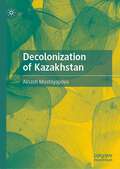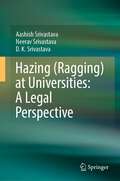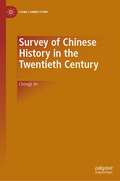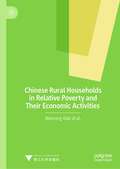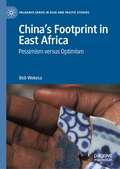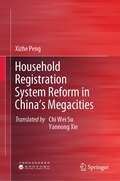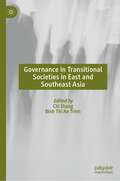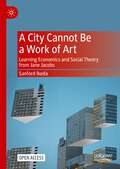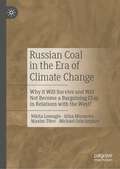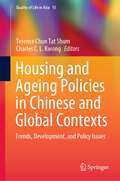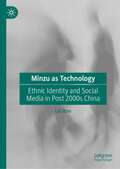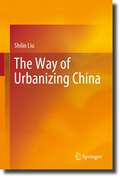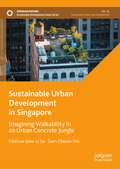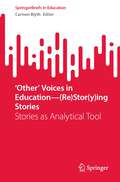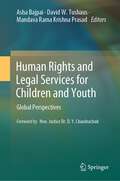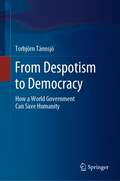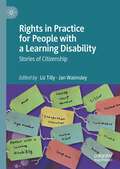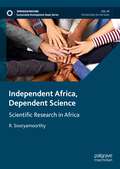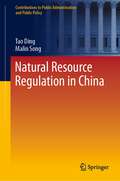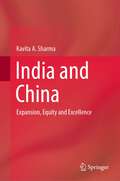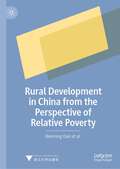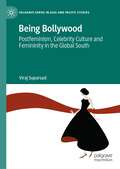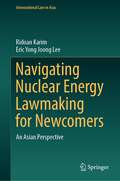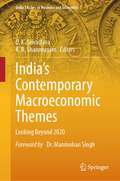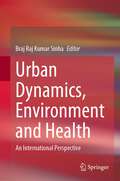- Table View
- List View
Decolonization of Kazakhstan
by Ainash MustoyapovaThis book is devoted to the problem of the decolonization of Kazakhstan, which is considered in the framework of postcolonial studies. The author raises issues of identity, historical and socio-cultural heritage of nomads. In addition, the book examines and destroys colonial and Soviet myths and stereotypes concerning the history, lifestyle and traditions of the Kazakhs. Considering that imperial sentiments are increasing in Russia (as a former metropolis), the process of decolonization seems to be urgently necessary for Kazakhstan. And this process is beginning to develop actively. This fascinating polemic will interest historians, scholars trying to understand the former Soviet space, and scholars of Eurasia.
Hazing (Ragging) at Universities: A Legal Perspective
by Aashish Srivastava Neerav Srivastava D.K. SrivastavaThis is the first socio-legal multi-jurisdictional study on hazing (ragging). This book considers four countries: the USA, India, Sri Lanka, and Australia. It states the legal position, identifies lacunas in law, and proposes possible legal solutions. Unfortunately, laws, regulations, and policies have failed to stamp out hazing from university campuses and residential colleges. Hazing has spiralled out of control in a number of countries. It has descended into a cruel, barbaric, and inhuman practice. The number of students subjected to hazing and sexual abuse is alarming. According to a 2022 survey, more than half (53%) of American students who were part of a fraternity or sorority experienced hazing. Students are murdered, harmed, abused, and suffer long-term trauma. The prevention of hazing is one of the most important responsibilities of 21st century universities. The theme of the book is that universities are in the best position to protect students from hazing and must play a vital role. As a sociological study, the book also considers why hazing occurs and what can be done to prevent it. Without engaging with the underlying causes, legal punitive measures continue to address the symptom rather than the cause. The book, therefore, explores how a more innovative approach to regulation can help tackle the cause. The book will be of interest to policy makers, regulators at universities, education and legal academics, and personal injury lawyers.
Survey of Chinese History in the Twentieth Century (China Connections)
by Chongji JinThis book presents a panoramic history of the Chinese nation spanning the twentieth century, with the great rejuvenation of the Chinese nation as its central theme. In their unwavering pursuit of national independence, universal emancipation, and a country of power and shared prosperity, the Chinese people undertook an arduous journey that saw China fundamentally transformed by such historic events and experiences as the overthrow of the imperial system in the 1911 Revolution, the founding of the People’s Republic of China, reform and opening up, and the construction of socialism with Chinese characteristics. Massive in scope, meticulously documented, and rigorously written, this volume has few rivals among general histories of China in the twentieth century.
Chinese Rural Households in Relative Poverty and Their Economic Activities
by Wenrong QianThis book summarizes the new economic phenomenon and problems of rural families in China from the perspective of relative poverty. Based on the data of China Rural Household Panel Survey (CRHPS), a nationwide on-site survey conducted door to door by Zhejiang University, this book focuses on the theme of relative poverty and provides a systematic analysis of the economic activities of rural households in three main aspects: agricultural production and management, land utility and transfer, and migration of rural households and citizenization of migrant workers. Besides, this book also explores focuses on the performance of relatively poor households in terms of agricultural production, land transfer, non-farm employment and social security, and provides a basic mapping of the situation of relatively poor households in rural China, so as to provide a scientific basis for improving the living standards of rural households, establishing a long-term mechanism for poverty alleviation. CRHPS not only includes individual-level and household-level data, but also corresponding community-level data, which makes it possible to conduct a comprehensive study of the rural households. Researchers of Chinese rural problems and government officials (especially the department of agriculture officials) will find this book especially interesting.
China’s Footprint in East Africa: Pessimism versus Optimism (Palgrave Series in Asia and Pacific Studies)
by Bob WekesaBased on an extensive literature review, in-depth interviews, fieldwork, and anecdotal evidence, this text examines China’s engagement with East Africa (notably Rwanda, Burundi, Kenya, Tanzania, and Uganda) and considers these relationships through the lens of history, diplomacy, education, trade, media, cultural exchanges, and infrastructure. It probes the sentiments of pessimism, optimism, and pragmatism to explore perceptions about China in East Africa Africa. China’s ancient connection to the East African coast, as well as other incidents of contact in the past, are analyzed from the viewpoint of the deployment of Chinese soft power capital in current times.The book notably examines the significant role China is playing in the construction of new infrastructure and housing throughout East Africa and addresses China’s involvement in the natural resources sector and the political debate surrounding the construction of gas and oil pipelines, its investment in the tourism sector, in the news media and information and communication technology sectors as well as in educational and cultural programs.
Household Registration System Reform in China's Megacities
by Xizhe PengThis book examines the impact of population growth and urbanization on the household registration system in China. Drawing on experiences from other countries in population management, it proposes a general framework for reforming the household registration system in China. This framework is based on the principle of "equity of rights and obligations" and includes a points system to guide implementation. The book also analyzes the economic implications of optimizing restrictions on urban household registration and the fiscal reforms associated with the reform. The practicality of the points system program is further verified.
Governance in Transitional Societies in East and Southeast Asia
by Chi Zhang Binh Thi An TrinhThis book brings together scholars based in, or had previously been based in a range of East and Southeast Asian countries, building on their respective primary empirical data and first-hand experience as academics and think tank researchers, in order to pluralise the current debates about governance in transitional societies. In an era of global democratic backsliding, this edited volume offers less-explored local perspectives, to balance the Western-centrism observed in area studies and the focus on former Soviet countries in transit. What is the future of governance in Asia? This book, by attempting to supply a diversity of answers, will interest political scientists, economists, and journalists.
A City Cannot Be a Work of Art: Learning Economics and Social Theory From Jane Jacobs
by Sanford IkedaThis open access book connects Jane Jacobs's celebrated urban analysis to her ideas on economics and social theory. While Jacobs is a legend in the field of urbanism and famous for challenging and profoundly influencing urban planning and design, her theoretical contributions – although central to her criticisms of and proposals for public policy – are frequently overlooked even by her most enthusiastic admirers. This book argues that Jacobs’s insight that “a city cannot be a work of art” underlies both her ideas on planning and her understanding of economic development and social cooperation. It shows how the theory of the market process and Jacobs’s theory of urban processes are useful complements – an example of what economists and urbanists can learn from each other. This Jacobs-cum-market-process perspective offers new theoretical, historical, and policy analyses of cities, more realistic and coherent than standard accounts by either economists or urbanists.
Russian Coal in the Era of Climate Change: Why it Will Survive and Will Not Become a Bargaining Chip in Relations with the West?
by Nikita Lomagin Irina Mironova Maxim Titov Michael OshchepkovThe Russian coal sector today faces challenges in the form of global decarbonization, sanctions, and difficulties in retaining market access and competitiveness. This new market environment warrants an examination of what lessons can be drawn from the past tribulations of one of Russia’s most iconic and strategically important industries. This book analyzes the Russian coal industry developments in historical and political contexts, including those of energy transition. The key tenets of contemporary dialogue between Russia and those who advocate for a speedy energy transition to phase out coal are presented. The book addresses the question of the coal industry as a sacrifice for the sake of Russia’s rapprochement with the West. The contribution of this book, therefore, is filling the gap between two large research inquiries – climate change mitigation and energy transition on the one hand, and the existing large coal industry of a given country on the other.
Housing and Ageing Policies in Chinese and Global Contexts: Trends, Development, and Policy Issues (Quality of Life in Asia #15)
by Terence Chun Tat Shum Charles C. L. KwongMotivated by the rapid increase in housing demand and the population of older adults worldwide, this book provides an interdisciplinary and multi-level approach for studying housing and ageing issues and relevant policy analysis in China, and beyond. Specifically, it highlights how the changing social, economic, and political factors at both local and global levels affect the housing or ageing experiences of people. Drawing on findings and theoretical discussions in economics, history, psychology, sociology, social policy, and urban studies, the authors offer interdisciplinary perspectives on a highly topical debate, asking what progress is being made on the formulation and implementation of housing and ageing policies in different societies. The book brings together original qualitative and quantitative research works in European, Asia-Pacific and Chinese contexts. Readers will benefit from the results of a rigorous analysis of data and case studies that reveal factors affecting housing or ageing experiences of people in these regions. The interdisciplinary research also provides valuable insights on further policy analyses and formulation in both local and global contexts. It is of interest to scholars, policy makers and university students in the fields of housing, ageing, and social and public policy.
Minzu as Technology: Ethnic Identity and Social Media in Post 2000s China
by Lei HaoThis book provides a unique ethnographic approach to the understanding of ethnogenesis in the Chinese context, with a particular focus on how it is being reshaped in the post-2000s era. It reinterprets the Chinese concept of ethnicity, or minzu, by investigating its evolution in relation to the proliferation of media technologies. In an era characterized by digital connectivity, the quest for ethnic identity has taken on new dimensions. Ethnic groups, like the Sibe community from Xinjiang, are now extending beyond the state’s traditional interpretations of minzu. Leveraging the power of media technology, they are articulating and expressing their ethnic identities in new and personalised ways. These developments have led to the emergence of what this book terms ‘networked ethnicity,’ a fresh manifestation of ethnic identity formation in the era of social media. The pivotal question this book attempts to answer is: How does an ethnic group in China today understand its identity, and what role does technology and media play in that process? This exploration offers a critical perspective on the complex interplay between digital technology, individual agency, and ethnic identity formation. This study will be of interest to scholars of cultural studies, Chinese society, ethnic studies, and media studies, or anyone keen to understand the changing landscape of ethnic identity in the digital age.
The Way of Urbanizing China
by Shilin LiuThe book conducts a comprehensive research study on China’s urbanization. It puts forward three theoretical development models of urban planning in China, i.e., the politics-oriented city, the economy-oriented city and the human-oriented cultural city. It makes objective evaluations of the development models of the politics-oriented city and the economy-oriented city. It suggests that relations between the government and the market should be straightened out to solve the hangovers of the development model of the politics-oriented city, and eco-civilization development and cultural development should be put on the top of the government’s agenda in order to cope with the recurring problems and complications brought about by the development model of the economy-oriented city.
Sustainable Urban Development in Singapore: Imagining Walkability in an Urban Concrete Jungle (Sustainable Development Goals Series)
by Melissa Liow Li Sa Sam Choon-YinThis book offers theoretical and practical insights into land use, transport, and national policies in one of world’s well-known urban concrete jungle, none other than the Singapore city. The emphasis is situated on Singapore’s attempt to promote walking and cycling. Greater appreciation of walkability thrives on Singapore’s rich history, green city, people and the gastronomic kopitiam and hawker culture. The book offers a comprehensive coverage of walkability as a crucial component of urban design to reduce vehicular congestion with the associated carbon emissions, foster a healthy lifestyle and community participation and create jobs to help the economy. A high income per capita and an aging society, lessons drawn from Singapore’s experience will be useful to other societies. Scholars in sustainable tourism field, urban planners, government bodies, tourist boards, entrepreneurs, national parks board, residents, and inbound travellers will benefit from reading the book.
‘Other’ Voices in Education—: Stories as Analytical Tool (SpringerBriefs in Education)
by Carmen BlythThis book explores how stories can be used as ‘data’ that prefigure and make possible the numerous permutations of life that comprise existence, and examines how stories can be reconfigured to transform that existence into something 'other'. It uses varied theoretical and critical frameworks such as autoethnography and posthumanism with which to explore the stories shared that go ‘beyond cause and effect’. This book looks to engage with storying and storytelling as inquiry in non-Western ‘worlds’, and looks to make ‘storying’, ‘restor(y)ing’, and ‘stories’ written by non-Western educators the locus of attention. By doing so, it seeks to illustrate what distinctive ways of storying and storytelling can look like in worlds other than those that follow a Western ethico-onto-epistemological worldview. It provides a way to articulate thought that may be commonly omitted in teacher education around the world, and looks at ‘truth’ as situated rather than as totality, local rather than global, with stories used to problematize subject/object positionings within those same stories.
Human Rights and Legal Services for Children and Youth: Global Perspectives
by Asha Bajpai David W. Tushaus Mandava Rama Krishna PrasadThis book discusses legal services clinics and various other access-to-justice initiatives that are established to protect and represent the rights and interests of children and youth in several countries across the globe. These could include legal services or access-to-justice clinics run by government or universities or community. The book has contributions from academicians, lawyers, researchers and legal professionals from several counties including India, UK, USA, Brazil, Australia, Indonesia, Poland, and Spain, which discuss how they represent children and youth in their countries. The book looks at how these access-to-justice initiatives currently provide assistance, what are the child friendly justice procedures they use, and best practices that can be replicable in other jurisdictions. The chapters contain findings of field research studies, some case studies, and models related to these topics. There are recommendations on ways to strengthen access-to-justice and legal services for empowering children and youth. The main goal is to create a resource for readers who want to expand child advocacy opportunities in their own universities and communities. The reader may also learn how to conduct legislative advocacy and case law advocacy to improve laws in other jurisdictions; and take-away best and replicable initiatives. The practices could be adaptable by other clinics and countries. The book will be useful to child rights advocates and defenders, students of law, legal researchers, civil society organizations, legal services authorities, legal aid institutions, educational institutions, school authorities, juvenile justice authorities, clinical legal educators, justice educators, justice practitioners and law and policy makers.
From Despotism to Democracy: How a World Government Can Save Humanity
by Torbjörn TännsjöThis book is about how best to respond to existential global threats posed by war and global heating. The stakes have become existential. A strong claim in the book is that we need a world state to save humanity. The book sheds new light on why this is so. The present author has long advocated global democracy. A strong argument against global democracy has been, however, that no state has ever been established without the resort to violence. In this book, the author bites the bullet and advocates a route to global democracy that passes through a phase where a global state is established in the form of global despotism. First despotism, then democracy! But, as the author insists and the reader will find, this is at most something we can hope for. We may fail. The moral importance of failure is thoroughly discussed.The book explored the following topics:· The tragedy of the commons is presented as the best explanation of why we do so little to obviate the causes behind climate change.· A world government presents a way out of the tragedy of the commons.· Standard arguments against a world state are examined.· The question of whether it matters if humanity goes extinct is taken seriously.· What if the attempt to establish a world state fails. The book is written by a philosopher, but the intended audience is broad. It has a place in courses in political philosophy, but it is possible for anyone who wants to do so to dig deeper into the questions should be able to read it. And regardless of whether you who read the book are a scholar or a layperson, there is no way for you to avoid its topic. Global existential issues concern all of us, regardless of profession or nationality.
Rights in Practice for People with a Learning Disability: Stories of Citizenship
by Liz Tilly Jan WalmsleyThis book aims to raise awareness about the possibility of achieving the goals of the United Nations Convention on the Rights of Persons with Disabilities (UNCRPD), in order for all disabled people to enjoy the benefit of human rights. The stories of people who have been supported to enjoy their rights and their citizenship will enable readers to focus on how services and support can enable people with a learning disability to have their rights upheld, with an outcome of citizenship, independence and achievement. Despite the UNCRDP being in place since 2006, a significant number of learning disability service provider organisations and professionals in the UK are not aware of its existence. This book aims to bridge the gap between policy and practice to demonstrate the value of a human rights approach as the foundation for services and support for people with a learning disability.
Independent Africa, Dependent Science: Scientific Research in Africa (Sustainable Development Goals Series)
by R. SooryamoorthyThis book offers an examination of Africa’s scientific landscape based on extensive empirical data encompassing fifty-four African countries. It traces the evolution of science on the continent, highlighting research areas, global partnerships, funding sources, research capacity, and the impact of science policies. Acknowledging that Africa relies heavily on external sources, particularly from the Global North, for scientific research, the book identifies and addresses obstacles hindering self-reliance and underscores the urgent need for revitalized partnerships and cooperation to bolster Africa's scientific autonomy. It offers valuable recommendations to promote self-reliance, making it an indispensable resource for scholars, policymakers, and practitioners.
Natural Resource Regulation in China (Contributions to Public Administration and Public Policy)
by Tao Ding Malin SongThis book makes an in-depth study of China’s natural resource regulatory system including theoretical basis, development process, asset accounting, ownership reform, system structure, legal safeguard and policy implications. China is a big country with vast natural resource. Improving the supervision system of natural resources and enhancing the supervision capacity of natural resources have become the top priority of China's economic and social development. This book focuses on how to establish an optimized, coordinated and efficient natural resource regulatory system in China and aims to improve China’s natural resource regulatory system. By combing through the process of historical change, analyzing resource accounting and pricing methods and studying the realization and reform of property rights, this book discusses China’s current problems in the process of natural resource regulation and then proposes solutions and implementation paths as a reference for the construction of the Chinese natural resource regulatory system. People who are interested in natural resource regulation could find something useful in this book.
India and China: Expansion, Equity and Excellence
by Kavita A. SharmaThis book provides a comprehensive overview of higher education in India and China and the complexity of issues involved. It focuses on gaining understanding of education systems, governance mechanisms, globalisation and emergence of the private sector, action policies of both the countries and their impact on education and society. Offering a comparative perspective, the book discusses why China is ahead of India in Higher Education when both share the similar challenges of burgeoning young population and scarcity of resources. It examines the success in providing equitable access to both country’s marginalised sections. It also discusses the directions of future growth through National Education Policy, 2020 and the 13th Five Year Plan of the Chinese State Council. Combining rich content and a broad scope, the book offers a valuable key to understanding Higher Education system of India and China. It is a useful read for students and researchers in social sciences, education area.
Rural Development in China from the Perspective of Relative Poverty
by Wenrong QianThis book provides a broad survey of Chinese rural households at a time of rapid change in China’s rural economy, examining the dual identity of households as consumers as well as producers of goods in terms of supply and demand. Based on the results of the China Rural Household Panel Survey (CRHPS) by Zhejiang University, this book analyzes four types of economic activities of rural households in China, particularly considering changes at the micro level. It examines how households strive to maximize family efficacy through input-output production decision-making in allocating limited resources. Examining data pertaining to agricultural production, land exploitation, migration and nationalization, as well as changes in economic behavior, this book offers a snapshot of the current situation of rural households in China and suggestions to improve living standards and related policies.
Being Bollywood: Postfeminism, Celebrity Culture and Femininity in the Global South (Palgrave Series in Asia and Pacific Studies)
by Viraj SuparsadThrough engaging media coverage of the public lives of Bollywood actresses, this book unveils understandings of idealized femininity and gender within this cultural context. Beyond its own borders, such a context is unique given the global relevance of content from and about Bollywood with members of the diaspora as well as those culturally Indian individuals that are no longer part of the diaspora. This book thus engages these actresses as global Indian celebrities who are framed and presented as contemporary urban Indian exemplars of gender via media coverage about them. The book therefore offers a robust and detailed case study of the Bollywood star system so as to demonstrate how the nuances of this unique cultural context influence the dimensions of postfeminism and celebrity culture therein.
Navigating Nuclear Energy Lawmaking for Newcomers: An Asian Perspective (International Law in Asia)
by Ridoan Karim Eric Yong LeeThis book provides a comprehensive overview of the legal and regulatory framework for the nuclear industry from an Asian perspective. It includes information on the history of nuclear lawmaking, the key international treaties and agreements that govern the use of nuclear energy, the role of national and regional regulatory bodies, and the legal and policy issues that arise in the development and operation of nuclear power plants. The book also covers topics such as nuclear safety, security, waste management, environmental protection, and liability for nuclear accidents. Additionally, it provides insights into the legislative process and the various stakeholders involved in nuclear lawmaking, such as industry, government, and civil society organizations. The overall goal of this book is to provide a detailed and up-to-date understanding of the legal and regulatory framework for the nuclear newcomers, particularly in Asia, and to help readers navigate this complex and dynamic field.The book is also used as a guide for all nuclear energy-producing countries, lawmakers, students, researchers, or even for general readers to understand the perspectives of international nuclear energy law.
India’s Contemporary Macroeconomic Themes: Looking Beyond 2020 (India Studies in Business and Economics)
by D. K. Srivastava K. R. ShanmugamThis book extensively examines various contemporary macroeconomic themes of India, namely growth and macro policies, tax reforms, government finances and intergovernmental fiscal transfers, banking and monetary policy, and environment and social sector policies. It has three to six chapters devoted to each of these broad themes, with the contributors being eminent economists from the region. The book serves as an excellent reference for students in economics, finance, and management, and a valuable tool for professionals such as policymakers and investment analysts and other stakeholders in the areas of global economics and finance, in general, and India in particular.
Urban Dynamics, Environment and Health: An International Perspective
by Braj Raj Kumar SinhaThe comprehensive volume focuses on spatial, temporal, conceptual and empirical approaches to various elements of urban dynamics, environment and urban health. It demonstrates a multidisciplinary account of the significant dimensions of urbanization and urban life. Chapters by leading international experts are presented in sections on urban dynamics, Urban Environmental Issues, Urban Health Problems and Urban Development, Planning and Policies. Each chapter provides a breadth of information on conceptual and empirical studies of urban issues. It enables the readers to understand the interconnections of various vital elements of each urban-related topical issue locally, regionally and globally. Extensive maps, charts, diagrams and tables as cartographic tools facilitate the reader’s understanding. It also outlines an action plan for policy program change in both the developed and less developed countries toward sustainable urban development and environment for better health, prosperity and quality of life of the present and future urban population. It is an indispensable reference for students, research scholars of geography and environmental, medical, and social sciences at undergraduate and postgraduate levels.
